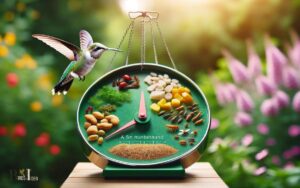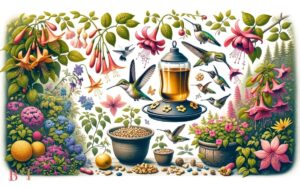Can Humans Drink Hummingbird Nectar? Yes!
Yes, humans can drink hummingbird nectar as it is primarily a simple sugar-water solution that is non-toxic.
However, it is not recommended for consumption as it lacks nutritional value for humans.
Hummingbird nectar is typically made from a mixture of sugar and water, mimicking the natural sucrose content of flower nectar.
The standard recipe usually involves dissolving 1 part white, granulated sugar in 4 parts water, without any added colors or flavors.
Here are some key points to consider:
- Safety: The ingredients in homemade hummingbird nectar are safe for human consumption
- Nutrition: For humans, this nectar is essentially empty calories and doesn’t provide any nutritional benefits.
- Hygiene: Feeders can contain bacteria or mold, which can be harmful if ingested.
- Dietary Needs: Unlike hummingbirds, humans have complex dietary needs that hummingbird nectar cannot meet.
While safe, drinking hummingbird nectar is not advisable, as it is not designed to meet human dietary requirements and is best left for the birds.

Key Takeaway
Understanding Hummingbird Nectar Composition
The composition of hummingbird nectar is a crucial factor in understanding its suitability for human consumption.
Hummingbird nectar primarily consists of water and sugar, with the ideal ratio being four parts water to one part sugar.
The sugar used is typically sucrose, the same type found in common table sugar. This simple composition makes it a suitable energy source for hummingbirds, providing the necessary calories for their high metabolism.
However, for human consumption, there are concerns about the potential presence of contaminants, such as pesticides or food coloring, which are commonly used in commercial hummingbird nectar.
The high sugar content may not be suitable for people with certain health conditions. Therefore, understanding the composition of hummingbird nectar is essential in determining its safety and suitability for human consumption.
Potential Risks of Ingesting Hummingbird Nectar
As we consider the potential risks of ingesting hummingbird nectar, it becomes crucial to address the toxicity of the nectar to humans and the potential health implications of ingestion.
Understanding the adverse effects and health risks associated with consuming hummingbird nectar is essential to raise awareness about its potential dangers.
Exploring the toxic components and their impact on human health will provide valuable insights into the potential risks of ingesting hummingbird nectar.
Toxic to Humans
Humans should be aware of the potential risks of ingesting hummingbird nectar due to its toxic properties.
While hummingbirds can safely consume the nectar due to their specialized metabolism, it can be harmful to humans.
The nectar is primarily a mixture of water and refined table sugar, but it can also contain red food coloring and preservatives, such as mold inhibitors.
Ingesting these substances can lead to adverse health effects, including gastrointestinal discomfort, allergic reactions, and potential toxicity. Moreover, the high sugar content can contribute to dental issues and metabolic imbalances.
Therefore, it is crucial for individuals, especially those involved in serving others, to exercise caution and prevent accidental ingestion of hummingbird nectar.
The table below highlights some potential risks of ingesting hummingbird nectar:
| Risk | Description |
|---|---|
| Gastrointestinal Discomfort | Ingesting hummingbird nectar, especially in large quantities, may lead to gastrointestinal discomfort such as nausea, vomiting, or diarrhea. The high sugar content can sometimes cause digestive issues in humans. |
| Allergic Reactions | Some individuals may be allergic to components in hummingbird nectar, such as certain types of sugars, food dyes, or preservatives. Allergic reactions can range from mild symptoms like itching or hives to severe reactions like anaphylaxis. |
| Potential Toxicity | The ingredients used in hummingbird nectar, particularly if homemade, may have the potential to be toxic to humans. For example, if non-food grade coloring agents or contaminated water are used, it could pose a risk of toxicity. |
| Choking Hazard | The viscosity of hummingbird nectar may be different from typical human beverages, increasing the risk of choking, especially in individuals with swallowing difficulties or young children. |
| Dental Issues | High sugar content in hummingbird nectar may contribute to dental problems such as cavities and tooth decay if consumed regularly without proper oral hygiene. |
| Caloric Overload | Hummingbird nectar is a concentrated source of sugar, and excessive consumption can lead to a caloric overload, potentially contributing to weight gain and related health issues. |
It’s important to note that hummingbird nectar is specifically formulated for the dietary needs of hummingbirds and is not intended for human consumption.
If there is accidental ingestion, it’s advisable to seek medical attention, especially if adverse reactions occur.
Individuals with pre-existing health conditions or allergies should exercise caution and consult with a healthcare professional if unsure about potential risks.
Health Implications of Ingestion?
With regard to the potential risks of ingesting hummingbird nectar, it is important to consider the health implications of such ingestion, particularly given the frequency with which accidental ingestion may occur.
Hummingbird nectar contains high levels of sugar, which can lead to various health issues in humans, including tooth decay, obesity, and diabetes.
The nectar may contain harmful bacteria or mold, especially if it has been left out for an extended period.
Ingesting contaminated nectar can result in gastrointestinal problems and other health complications.
Furthermore, the presence of artificial red dyes in some commercial hummingbird nectars may pose risks to human health.
Therefore, it is crucial for individuals to be aware of these potential health risks and to take necessary precautions to avoid accidental ingestion of hummingbird nectar.
Effects of Hummingbird Nectar on Human Health
Studying the consumption of hummingbird nectar by humans reveals potential health implications.
While the sweet liquid may seem harmless, it can have adverse effects on human health, including:
- Dehydration: Hummingbird nectar lacks essential electrolytes, potentially leading to dehydration if consumed in large quantities.
- Digestive Issues: The high sugar content may cause digestive discomfort and disrupt the natural balance of gut flora.
- Nutritional Deficiencies: Regular consumption of nectar may lead to deficiencies in essential nutrients, as it does not provide the balanced nutrition humans require.
Understanding these potential health effects is crucial for those seeking to serve others by providing accurate information and promoting well-being.
To mitigate these risks, it’s important to take safety precautions when handling hummingbird nectar.
Safety Precautions for Handling Hummingbird Nectar
When handling hummingbird nectar, it is important to be aware of the potential risks associated with consumption, such as bacterial contamination.
Proper preparation of the nectar, including the correct ratio of sugar to water, is crucial to ensure the safety of both humans and hummingbirds.
Maintaining proper storage and sanitation practices can help minimize the risk of microbial growth and preserve the quality of the nectar.
Nectar Consumption Risks
The handling of hummingbird nectar requires strict adherence to safety precautions to mitigate any potential risks associated with consumption.
It is essential to prioritize the well-being of both humans and hummingbirds when dealing with nectar.
To ensure the safety of all involved, consider the following precautions:
- Use Safe Ingredients: Only use high-quality, food-grade ingredients to prepare hummingbird nectar.
- Proper Storage: Store nectar in clean, tightly sealed containers to prevent contamination and spoilage.
- Regular Cleaning: Thoroughly clean all feeders and utensils used for handling nectar to avoid bacterial growth and ensure the health of the hummingbirds.
Proper Nectar Preparation
Following the precautions outlined in the previous section, it is imperative to emphasize the meticulous approach required in preparing hummingbird nectar to ensure the safety of both humans and the hummingbirds.
To start, always use granulated white sugar and water in a 4:1 ratio, boiling the water to dissolve the sugar completely.
It is crucial to let the nectar cool completely before filling the feeders, as heat can be harmful to the delicate bills of hummingbirds.
Furthermore, never use honey, artificial sweeteners, or food coloring, as these can be detrimental to the birds’ health.
Clean all feeders and utensils with hot water and mild soap, rinsing them thoroughly to prevent the growth of harmful bacteria.
By adhering to these precautions, you can ensure the well-being of the hummingbirds while serving their nectar needs.
Next, let’s explore the importance of storage and sanitation in maintaining the integrity of hummingbird nectar.
Storage and Sanitation
Proper storage and sanitation are essential for maintaining the integrity and safety of hummingbird nectar, ensuring it remains free from harmful bacteria and contaminants.
To ensure the safety of the nectar, consider the following:
- Store the nectar in a clean, airtight container to prevent bacterial contamination.
- Regularly clean and sanitize the hummingbird feeder to avoid the growth of mold and harmful bacteria.
- Keep the nectar refrigerated when not in use to prolong its freshness and discourage bacterial growth.
Alternative Uses of Hummingbird Nectar
One potential application for hummingbird nectar is as a sweetener in culinary recipes and beverages.
The natural sweetness of the nectar can add a unique and delicate flavor to a variety of dishes, including desserts, dressings, and marinades.
When used in beverages, it can enhance the taste of teas, lemonades, and cocktails. Its light and floral notes can provide an interesting twist to traditional recipes, appealing to those who desire to serve delightful and innovative dishes.
Hummingbird nectar can be used as a glaze for fruits or as a drizzle over pastries, contributing to a memorable dining experience.
However, it is crucial to consider the ethical and environmental implications of using hummingbird nectar in culinary applications.
Transitioning into the subsequent section about ‘hummingbird nectar and human consumption’, it is essential to explore the potential impact on the hummingbird population and the ethical considerations of utilizing their nectar.
Is it Safe for Humans to Drink Non-Refrigerated Hummingbird Nectar?
Is it safe for humans to drink non-refrigerated hummingbird nectar? While hummingbird nectar should be refrigerated to preserve its freshness and prevent bacterial growth, it may not pose immediate harm to humans if consumed at room temperature. However, it is advisable to refrigerate it to maintain its quality and ensure safe consumption for hummingbirds, their intended beneficiaries.
Hummingbird Nectar and Human Consumption
As we delve into the topic of Hummingbird Nectar and Human Consumption, it is important to consider the ethical implications and potential impact on the hummingbird population when exploring the use of their nectar for human purposes.
The delicate balance of nature must be respected, and any human consumption of hummingbird nectar should be approached with caution and mindfulness to avoid harming these remarkable creatures.
- The well-being of hummingbirds should be a top priority when considering the use of their nectar.
- Ethical and sustainable practices must guide any potential human consumption of hummingbird nectar.
- Conservation efforts and education on the importance of preserving natural resources for hummingbirds should be promoted and supported.
It is crucial to prioritize the welfare of hummingbirds and their habitats as we navigate the potential implications of human consumption of their nectar.
Conclusion
Despite the tempting sweetness of hummingbird nectar, it is not safe for human consumption.
The composition of the nectar and potential risks associated with ingestion pose significant health concerns.
It is important to handle hummingbird nectar with caution and adhere to safety precautions to prevent any negative effects on human health.
Instead of consuming hummingbird nectar, individuals can appreciate the beauty of hummingbirds and their nectar by observing them in their natural habitat.






